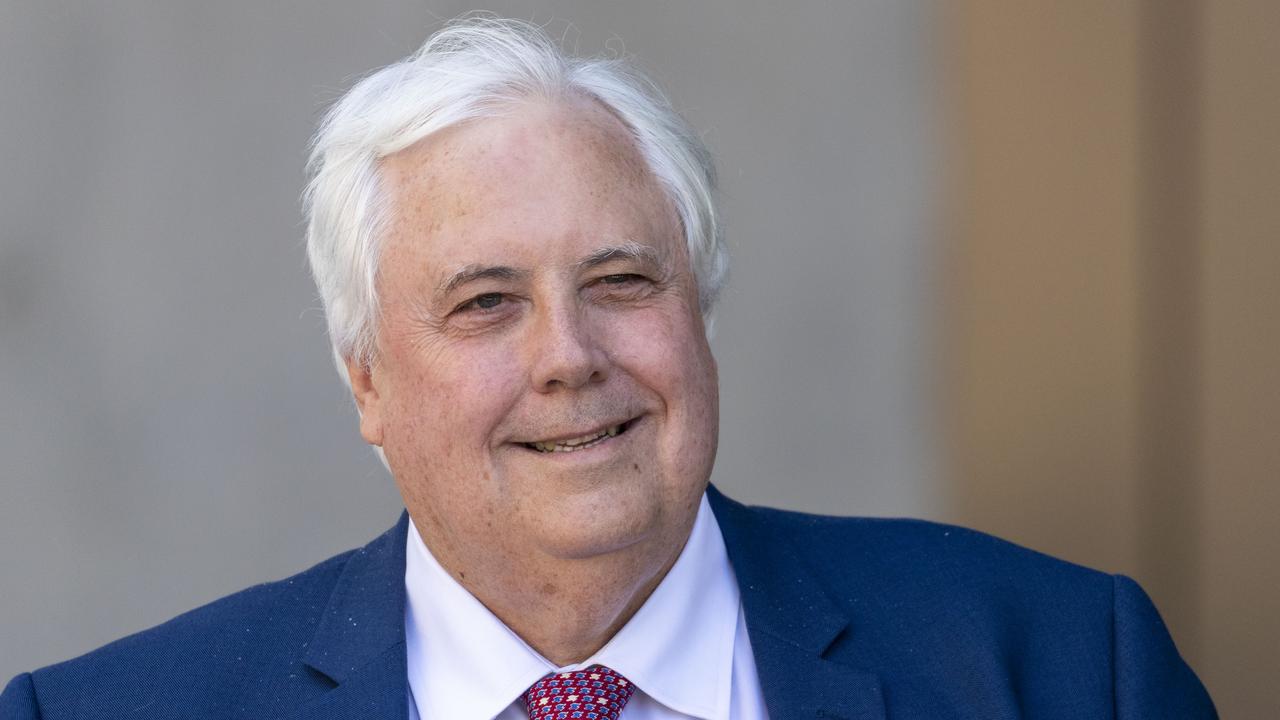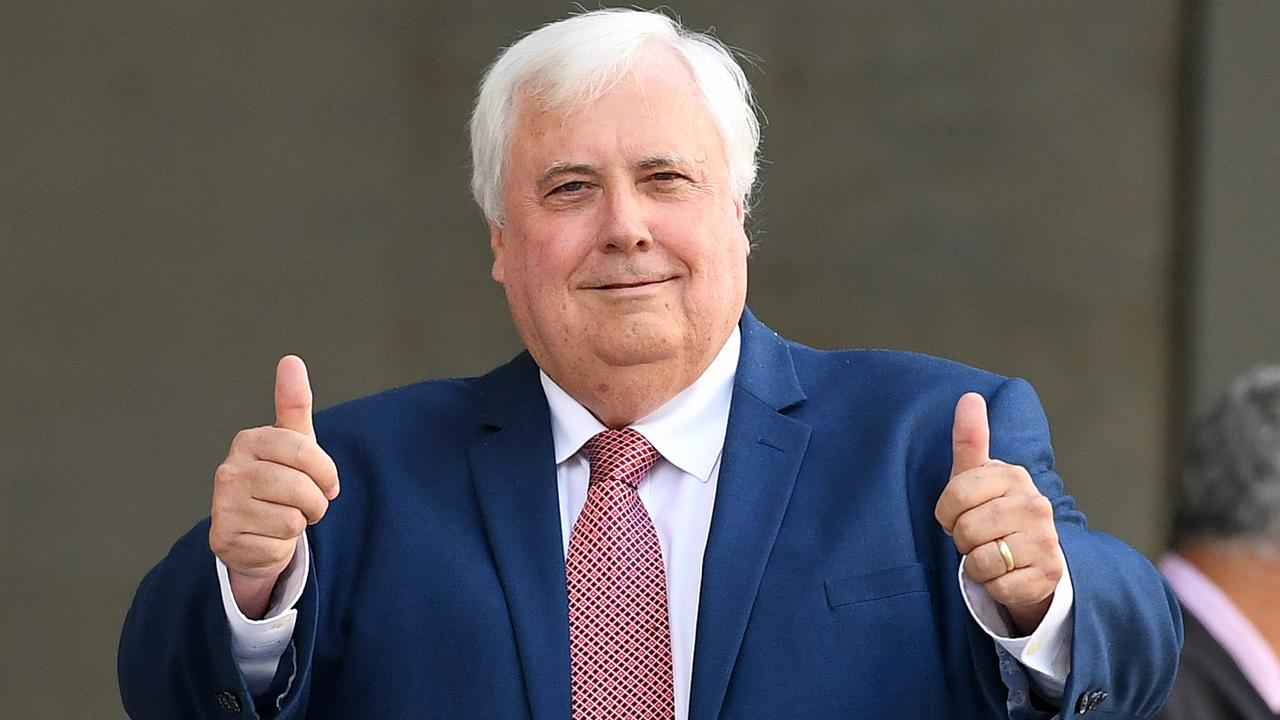Palmer accounting: cash crisis one week, $1bn boast the next
Clive Palmer’s nickel refinery in September declared $1.1bn in income despite the warning of a looming cash crisis.

On September 7, Clive Mensink — Clive Palmer’s nephew and the head of his Queensland Nickel business — signed off on a set of accounts that declared the refinery had enjoyed “total comprehensive income” of more than $1.1 billion during the 2015 financial year.
He also declared that, even with the nickel price continuing to weaken, he was of the opinion “there are reasonable grounds to believe the group will be able to pay its debts as and when they fall due and payable”.
However, The Australian has learned that more than a week earlier Queensland Nickel’s long-serving chief financial officer, Daren Wolfe, realised the reality was far less certain.
Data received by Mr Wolfe at the end of August contained a clear warning — the refinery was fast running out of cash. In fact, without an injection of new funds, Townsville’s biggest private employer would be out of money by this month and unable to pay its bills.
Affidavits obtained by The Australian show big debts are now racking up — rail group Aurizon is owed $15.5 million and the Australian Taxation Office is due $4.6m in unpaid fuel excise, while chemicals company Ixom is waiting for a $1m payment for ammonia. Payments were due last Monday.
The Queensland government, being asked to ride to the rescue with a $40m bailout, is also in the red, with its state-owned electricity companies Stanwell Corp and Powerlink Queensland waiting for payment of $595,000 for overdue electricity bills.
An analysis of Queensland Nickel’s accounts show there had been no real money behind that rosy headline income figure of $1.1bn; it was derived entirely by unrealised accounting adjustments. In the real world, Mr Palmer’s refinery bled almost $20m in negative cashflow in the 2015 financial year and was under mounting pressure as nickel prices continued to fall.
Despite this, Mr Mensink and the business’s auditors Ernst & Young signed off on the accounts.
Affidavits filed by Mr Wolfe and Mr Mensink for this week’s unsuccessful attempt to force Mr Palmer’s estranged Chinese business partner Citic to hand over $US48m ($66.88m) reinforce the urgency and intrinsic financial issues within the company.
The affidavits, filed in the West Australian Supreme Court, stand in contrast to the illusion created by the self-described billionaire and federal member for Fairfax that his empire remains in rude financial health.
The affidavits also confirm that Mr Palmer and Mr Mensink made sure that the “dire” financial position of Queensland Nickel be kept secret from senior management and employees at the refinery so as not to cause alarm. Included in the affidavits is a spreadsheet prepared by Mr Wolfe for internal purposes, spelling out how Queensland Nickel’’s available cash would run out by last Monday. The cash deficit was projected to remain until April next year.
That reality is a far cry from the budget originally prepared for Queensland Nickel for 2016, and included in one of Mr Mensink’s affidavits. It shows that, despite modelling for the average nickel price to fall from $US7 a pound to $US6.43, Queensland Nickel expected free cashflow out of the business to swing from -$19.5m in 2015 to $53.6m in 2016.
The hope was that a fall in the Australian dollar would outpace the decline in the US dollar nickel price, helping restore the refinery’s profitability.
While the Australian dollar has done its part for Mr Palmer, the drop in the nickel price has been much more severe.
At its simplest level, Queensland Nickel — which nowadays sources much of its ore from the Pacific nation of New Caledonia rather than closer to its north Queensland base — is the victim of a nickel price fall that has crippled producers globally.
The cyclical nature of the resources industry means many mines and refineries find themselves in such predicaments from time to time. The options are simple: either close the operations or find a way to prop them up until prices recover.
The latter has been the choice at the Queensland Nickel refinery over its 40-year history. Previous owner BHP Billiton had its deep pockets to help through lean times. In fact, BHP was so worried about the future of its Queensland Nickel refinery when it sold it to Mr Palmer in 2009 that it imposed conditions to prevent any stripping of assets or cash for three years.
The sale agreement, obtained by The Australian, show that Queensland Nickel came into Mr Palmer’s hands with $US40m in working reserves.
However, Mr Palmer overcame the contractual restrictions to spend tens of millions of dollars of the Townsville refinery’s working capital on golf courses on the Gold Coast, buying the Hyatt Regency resort at Coolum (now a defunct dinosaur park), a wedding venue, luxury cars and a coal tenement.
Last financial year, the refinery company “forgave” $38.3m in loans made to other entities controlled by Mr Palmer. While $27.6m was shifted from Mineralogy to Queensland Nickel in 2013 to help it navigate a weak market, Mr Palmer no longer has the ability to draw funds from elsewhere. The days of lavishing employees with overseas holidays and Mercedes-Benz cars as Christmas bonuses are long gone.
“Due to the current nickel price being lower than QN’s cost of production, QN can only sustain itself by external cash injections. Mineralogy is not in a financial position to make such financial injections in the future,” Mr Wolfe, who is also the chief financial controller for Mr Palmer’s other companies, including Mineralogy, said in his affidavit.
There is also little prospect of relief from a recovery in nickel prices. If the latest nickel price forecasts from investment bank Goldman Sachs are accurate, Queensland Nickel may be years away from returning to profit.
That helps explain the reluctance of the Commonwealth, Westpac, ANZ and NAB banks, plus Queensland’s Suncorp, to loan money to Queensland Nickel. It may also explain the reluctance of Mr Palmer to step in with funding from his own pockets, if indeed he actually has that sort of money to spend.
While the problems at Queensland Nickel can be condensed down to the weakness in nickel prices, the business’s situation has not been helped by its links to Mr Palmer’s other interests. As WA Supreme Court judge Paul Tottle noted in his judgment on Monday rejecting Mineralogy’s grab for cash, Queensland Nickel was deemed sufficiently profitable as recently as the 2014 financial year to donate more than $15m to the Palmer United Party.
While the problems are real, there does appear to be an element of brinkmanship at play.
The affidavit material says December 4 was originally the date by which Mineralogy and Queensland Nickel needed a cash injection, or else the refinery would close and the 767 workers sacked. As it became clear the court case could only be heard by December 7, Mr Mensink updated his affidavit to say the drop-dead date had shifted to the same day. Now, days later, the refinery continues to operate and the workers remain in their jobs. That, of course, could change any moment, given Mr Mensink knows his obligations as a director to ensure Queensland Nickel does not trade while insolvent.



